The Battle of Bastogne: December 1944 - LSC-Kingwood
BASTOGNE
December 1944
White Christmas Red Snow
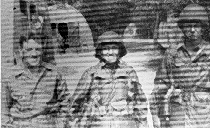
A Journal by Prof. Eduardo A. Peniche
Combat Veteran 101st Abn. Div.
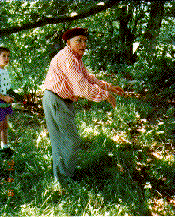 |
Ed Peniche, pictured here in 1994, at the site where his AT gun was emplaced Christmas 1944, is a retired Professor of Spanish at Lone Star College-Kingwood, in Kingwood, Texas, northeast of Houston. By virtue of military service he is a DMOR 502d Infantry 101st Abn. Division. He is also a Distinguished Member of the Mexican Army Airborne Cadre; and is Red Hat # 183 in the Vietnam Airborne Society. He is also a Charter Member of the Blue Ridge All Airborne Chapter, 82nd Abn. Div. Association. Prof. Peniche is a trained linguist in English, Spanish, Portuguese, French and Vietnamese. He has taught in colleges in Kentucky, Virginia and Texas. A native of Yucatan in Southern Mexico, he became a U.S citizen in 1953. He is married to Dean Baggett-Peniche; they have two sons and five grandchildren. |
The chronology of the events narrated below came from notes jotted down in Spanish by Ed Peniche for his father. Soldiers were prohibited from keeping diaries or unit photographs while on the front lines. Ed jotted brief notes to keep track of time and surroundings and weather. While recovering from his wounds during a two month stay in the hospital in England after being wounded on January 3, 1945, he edited and expanded the notes to the best of his recollection and prepared a journal for his family. Of all his combat time (four major campaigns) Ed's experience at Bastogne is one that affected him the most because of the freezing weather which terrified and tortured the soldier day and night.
On Christmas Day, 1945 in sunny Yucatan, Mexico, surrounded by his family, he gave his parents the journal as a gift. Tears were shed by those present when Ariosto Peniche, in a solemn voice, read the events of Christmas Day, 1944. He remarked, "How sad and dreadful to experience savage fighting on the day of our Lord. May our Peace be everlasting, son."
Professor's original notes for this journal were in Spanish, later translated into English by Ed for his sons at the insistence of his father. Years later it turns out, Ed's notes jibed quite well with those of his Squad Leader, Sgt. Joe O'Toole who published his journal in the Vincennes, Indiana paper where he worked as a printer.
The journal printed here recounts a 10 day period during the Battle of Bastogne, December 1944.
Saturday, December 16
Word about the German offensive in the Ardennes came to us that very Saturday night,
December 16th. We heard about it after midnight from the U.S. Army MPs who were out in force clearing out bars, bistros and bordellos in the city of Reims in northern France; there were plenty of 2 1/2 ton trucks available to take the men of the 101st and 82nd Airborne Divisions back to their barracks. My buddies and I were among the first to heed the MPs' orders. There was, of course, a lot of bitching and complaining, and some of the troopers, drunk or not, were using profanity to express their dissatisfaction. And why not? We had just come to France for R&R barely two weeks before after 72 days of continuos fighting in Holland where we had participated in Operation Market-Garden; the Airborne operation launched to liberate the Dutch people from Nazi occupation.
Sunday, December 17th
Upon getting back to camp there was a lot of activity there. Officers and NCOs were making sure that everyone got busy doing what they were supposed to do: cleaning weapons; drawing ammunition and rations; pack personal belongings; pack bed rolls and musette bags: underwear, socks, toilette articles, towel, mess kit and gear, etc.; canteen and canteen cup; "Don't forget gas mask and first aid kit ..."
That went on all day Sunday, December 17th; however, we did have a break for religious services. I went to Mass with Joe O'Toole, Joe Fair and two or three others. Sunday mass was something I enjoyed, besides it gave me the chance to chit chat in Spanish with other Hispanics from the parachute infantry units.
After lunch, the lunch was better than usual, we went to the motor pool area to check our 1/4 ton prime-mover (Jeep) and to the gun shed to clean and "bore-sight" our anti-tank gun, our piece was a 57 mm, actually a British Six pounder with double protective shields for the AT gunner and gun crewmen. We were so busy doing so many things that there was not much time to concentrate on the fact that soon we will be heading back to engage the enemy. This move to the front lines was going to be different from Normandy and Holland; in both of those operations we had landed behind enemy lines by parachute and glider, this forthcoming movement to Belgium was going to be by truck. I managed to write one of those short Victory letters to my parents before going to bed. Of course, because of censorship regulations, I did not mention that we were about to go to the front again, but in my usual way, I managed to let them know that I was doing fine and that I might have to move elsewhere. I told my mother about the morning mass and I told my dad about a bar that I had seen in Reims where they served better quality of "calvados".
Monday, December 18th
We left Camp Mourmelon about 1700, Monday, December 18th; we left by "cattle" truck; we were assigned to Co. "D" 2nd BN, 502d Parachute Infantry Regiment. We traveled all night with black-out lights. Sgt. Joe O'Toole and two others were traveling by jeep pulling the AT gun. The long convoy was moving rapidly, under the circumstances, yet we managed to get two or three "pee" calls; the night was pretty chilly and one could feel the cold air in those open trucks. Being packed like sardines helped a bit, but it was standing room only. As we approached the Bastogne area we were able to hear at the distance the sound of the artillery, ours and theirs! I guessed.
Tuesday, December 19th
By early Tuesday morning, still dark, December 19th, we were at the edge of the village of Longchamps, 5 kms north of Bastogne. The 2nd Bn 502d P.I.R was straddling the main road that led from Bertogne to Bastogne. With the assistance from "D" Co. men, using various pieces of farming equipment and other materials, we established a road block on the portion of the highway connecting Bertogne to Longchamps. Our AT gun emplacement was on the right hand side of the road on the grounds of an abandoned farm house at the very edge of the village (Longchamps). A few miles to our right, we could already hear the sounds of the firefight; both of our sister regiments, the 501 P.I.R. and the 506th P.I.R. were making contact with the enemy. The message to the German attacking forces was clear, the Screaming Eagles are here to fight.
By daylight, Francis Papaleo and I , who constituted the AT squad bazooka team, paced the edge of the road and judged various possible positions to cover the road block. Our gun was well dug in; we also dug in two or three trenches to place the AT shells away from the emplacement. The farm house was about fifty yards behind our position; all of us also dug up our individual foxholes, Darrell Garner, our Gunner, and I were to share a foxhole; we gathered straw for the bottom of our protective trench. Sgt. O'Toole instructed us that we could use the barn from time to time, but he did not want us entering the farm house. Obviously the family that owned it, had been evacuated with the return of the German army to Belgium.
Wednesday, December 20th
On Wednesday, December 20th. about 1430 hours, we engaged a German Recon unit that came to the road block and we destroyed one of their vehicles and damaged another of their half-tracks as they tried to turn around upon discovering that we were defending that sector of the perimeter. Our position was on a knoll with a clear view of the valley slopping down between Longchamps and Monaville {to our right}. The weather was turning colder and some snow began to fall.
Thursday, December 21st
On Thursday, December 21st, we woke up with a heavy blanket of snow and the cold weather was making us feel miserably uncomfortable; we started making trips to the barn more often to warm up. The snow stopped falling about mid afternoon, but the temperature got much colder. The 2nd Bn. had increased its patrolling activities in our sector. O'Toole told us that the word from the CP was to conserve our ammunition and our rations.
Friday, December 22nd
By Friday, December 22d, the heavy blanket of snow covered our entire sector and we were surrounded by the enemy. We were now with "F" Co and Co. "D" had moved to our right; they were being shelled by enemy self-propelled guns. It was incredibly cold; the water in our canteens was freezing. We also had to rub each other's feet to prevent frostbite. From our foxholes, despite the horrible weather, it was fascinating to gaze at the wintry scenery, the snow was pretty deep and very white. The wind had picked up; it was much, much colder - - I was terrified by the thought of freezing to death; being a 19-year-old soldier from the Yucatan in southern Mexico, I had never experienced snow on the ground, much less standing and sleeping on frozen ground.
Saturday, December 23rd
On Saturday, December 23d, our lines came under heavy mortar barrages; the activity to our right flank also intensified. Our P-47s bombed and strafed the German positions directly to our front. We also knew for sure that we were completely surrounded by the Germans when we saw our C-47s (cargo planes) dropping supplies inside our perimeter. Seeing all those planes and parachutes seemed to us that we were witnessing a miracle, it was a warming and beautiful sight. O'Toole told us that back in the Platoon CP, Lt. Hill's jeep had received a direct hit from a heavy mortar round; we were sure that neither the Lt. nor his driver were just sitting there in the vehicle!
Sunday, December 24th
On Sunday, December 24th, our P-47s and P-38s came over at daybreak. We were told that the enemy had given the division an ultimatum to surrender but it had been refused. - - We all got a big kick when we heard that General McCauliffe had said "NUTS" ! to the enemy. - - We also knew that things could get worse ....More supplies came by air and except for the freezing weather, we were in high spirits and sort of confident. The vigil of Christmas began rather badly. That night, Christmas eve, the Lufftwaffe bombed Bastogne twice. - - Yet, on that unholy night, history has recorded an unforgettable mass that took place in town; wounded Airborne soldiers shed tears at the tune of "Silent Night". The German POWs were visited by Gen. McCauliffe himself as they were singing "Stille Nacht" and " O Tannenbaum". He wished them a Merry Christmas!
NOTE: This was a Christmas eve for all times, at this important road junction in Belgium, 40,000 Germans, about 17,000 Americans, and 3,000 Belgian civilians were destined to spend Christmas Day. But, siege or no siege, civilians and fighting men on both sides were being touched by the advent of Christ. It was meant to be a white Christmas, indeed, and those involved would celebrate as best they could.
Monday, December 25th, Christmas Day
In the forward areas of the perimeter, in the MLR {Main Line of Resistance}, what is called today FEBA, the forward edge of the battle area, - - in that place where the outcome of the battle is finally decided - - clinging to our foxholes in the frozen ground, we sank into deep thoughts and emotions. I thought mostly about home in the Yucatan in southern Mexico where we never have snow; I thought about my family there and my relatives in Paducah, Kentucky, I was wearing a sweater, OD color, which had been sent to me for Christmas in early December by my cousin Marie. {I still have it}.
That very night, on the opposite side of our lines, the enemy activity had increased . -- We did not know it at the time, but the Germans were having a large scale deployment to launch a major attack against the northwestern sector of the Bastogne perimeter; the area defended by the 502nd Parachute Infantry Regiment - - Bastogne, indeed, would make a worthy Christmas present for the Fuhrer. It was going to be, indeed, an unholy night for the 502d!
Suddenly, around 0300 a.m. the first barrages crashed against our positions, a few German planes droned over regimental headquarters and dropped bombs. Minutes later, wearing snow suits, the first grenadiers crept forward against our lines, supported by a few tanks. The fire fight in our left flank intensified - - "A" Co. 1st Bn, was catching the brunt of the assault. The enemy was determined to break though - - but the "Deuce" was not about to yield easily. Champs and Hermoulle were the objectives, no doubt about it, it was a major assault.
As the ground shook under the impact of the heavy shelling, the snow covered battlefield soon became an spectrum of bright flares and deafening explosions and machine-gun tracers .... The attack was on, it was Christmas Day already, lying face down in the bottom of my icy foxhole, I remember praying both in English and Spanish. A few mortar rounds exploded in front and behind our position, yet the activity to our left was gaining intensity. Our outposts between Longchamps and Champs had been reinforced and our machinegunners were delivering flanking fire against the attacking German infantrymen. Our own parachute infantry was also being deployed to meet the enemy threat; these men were the brave rifles from Co "E" 2nd Bn. 502d P.I.R. To me, personally, this was a defining moment in my life as a soldier and as an American, to see well disciplined courageous fellow soldiers well motivated to follow orders under the most hellish of circumstances yet, without hesitation, at that very trying moment everyone seemed to know what had to be done and they DID IT!
The enemy attack ended in failure. The Five-o-deuce had held firm. The assault force had suffered heavy casualties and was forced to withdraw. There were also, of course, American casualties, in grotesque forms the death froze into eternity.
Tuesday, December 26th
Bastogne was relieved the next day, Tuesday, December 26th by the 4th Armored Division of General Patton's Third U. S. Army. The Ardennes was, of course, not the first time that American soldiers had fought under adverse conditions. At the birth of our nation there were cold ...tired ... and hungry soldiers at Valley Forge, but at Bastoge and throughout the Battle of the Bulge, the resourcefulness and dependability of the American fighting men were highlighted by the GIs themselves. Were we prepared for Bastogne? I believe we were; we certainly were well-trained and well-led; AND above all, we had that Airborne esprit-de-corps which always prepared us to fight facing the enemy from all sides as we did in Normandy and in the Liberation of Holland during Operation Market-Garden.
Success in the perimeter was achieved not by chance, or because of air superiority - - it was won by officers and NCOs {From General to Sergeants} who provided exemplary leadership and by soldiers who knew how to follow orders, and yet had the initiative to act on their own when necessary. - - As such, I remember my Squad Leader Sgt. Joe O'Toole from Vincennes, IND.; my foxhole buddy, our gunner, from Florence, S.C.; Francis Papaleo, from South Philadelphia; Alfred Steen from Brooklyn, NY; Sgt. Bill Robinson; Cpl. Dale Reeder; Lt. James R. Hill; and last but not least, our AT Btry C.O. Capt Bill Lockman, from West Palm Beach, FLA. I also remember Sgt. Lawrence Silva from "D" Co. Yes, I remember all of them because destiny and faith had bound us together as one of the finest divisions ever fielded in battle: The Screaming Eagles of the 101st!
The siege of Bastogne, Belgium was a frightful experience never to be forgotten; and hopefully, never to be repeated again. Misery on the battlefield was compounded by the severe winter of that year. YET, despite the adversity of war, all those involved were able to find warmth, strength, and comfort in man's eternal hope for universal fraternity and man's eternal search for divine guidance. As for me personally, like that of my fellow soldiers, it was my destiny to take part in and survive that gallant feat of arms; and, as miserable and terrifying as the experience was, it enriched my life forever because I learned to have faith and trust in my superior officers and in my fellow soldiers: it enriched my life because I learned first hand about the true spirit of America, by never hearing anyone ever express the word surrender. - - YES, Bastogne was part of the rendezvous with destiny of the Screaming Eagles of the 101st Airborne Division, and I am proud for having been there - - I had had my first White Christmas in that small Belgian town, and there were enough lights to last me a life-time.
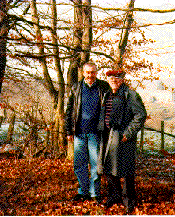 |
(Ed Peniche, right, and Adrien Luc, stands on the spot where he fell Wounded In Action 3 January 1945, near his foxhole on the grounds of the Luc-Feller Farm. Dec. 1994.) |
I did survive the siege, but little did I know, that on 3 January 1945, during a ferocious all out attack against our front by the 9th SS Panzer Division, Sgt. O'Toole, Darrell Garner and myself were to fall among the many wounded during that bloody engagement. Sgt Silva, however, as well as quite a few other dedicated and brave parachutists from the 2nd Bn 502d Parachute Infantry Regiment were destined to be killed in action that very afternoon. The German attack was repulsed; there were heavy casualties on both sides. For the men of the 2nd Bn., it was their finest hour. As I left the battle area in an ambulance heading for a field hospital in Arlon, I knew that I had stood there rubbing shoulders among America's finest citizen-soldiers. I still thank our Lord for sparing my life and granting me the privilege to remember them and to honor them till the end of my days!
We are proud to put this brief journal of Professor Peniche online and to share his wealth of first hand information with those who have interest in World War II. Professor (then Private First Class) Edward A. Peniche received the Bronze Star Medal for heroism in ground combat. The citation on this Bronze Star declaration states
For distinguishing himself by heroic achievement in action. On 3 January 1945 in the vicinity of Longchamps, Belgium, strong forces of enemy infantry and tanks launched a determined attack on his unit. As a member of a 57mm antitank gun squad, aware of the great danger involved, he volunteered to carry ammunition forward to his gun. Exposed to the most intense enemy artillery, tank and machine gun fire, Private First Class Peniche performed his difficult task. Although wounded, he continued his work. When two members of his squad became seriously wounded and the gun was destroyed, he again exposed himself voluntarily to enemy fire in order to report the situation and guide medical aid men to the casualties. His actions were in accordance with the highest standards of the military service. Citation, The Bronze Star Medal, Sergeant First Class Edward A. Peniche
Peniche's foxhole buddy, Darrell W. Garner, referred to in the citation above, wrote to him in July, 1985, and attested to this citation by writing, "... I'll never forget when you put your own life on the line to get the medics for me even though you were wounded yourself and the Germans were still shooting at us. You showed what a big Mexican American you were. No one could ask for more."
Closing Remarks
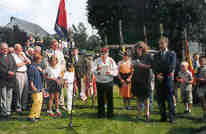 Ed Peniche retired from Lone Star College-Kingwood in May 1998. In August of that year, at a ceremony in Mexico City, he was officially recognized as the co-founder of the Mexican Army Airborne School and in October he received the award of Teacher of the Year from Mrs. Laura Bush, First Lady of Texas. In May 1996 he was recoginized as Professor Emeritus in the Virginia Community College System and in June of that year he was a participant in the National Security Seminar held at the U. S. Army War College, Carlisle Barracks, PA.
Ed Peniche retired from Lone Star College-Kingwood in May 1998. In August of that year, at a ceremony in Mexico City, he was officially recognized as the co-founder of the Mexican Army Airborne School and in October he received the award of Teacher of the Year from Mrs. Laura Bush, First Lady of Texas. In May 1996 he was recoginized as Professor Emeritus in the Virginia Community College System and in June of that year he was a participant in the National Security Seminar held at the U. S. Army War College, Carlisle Barracks, PA.
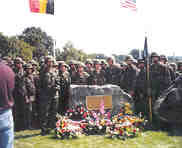 In May 1999 he received the NISOD Award for excellence in education and on Sunday, 25 July the same year, 54 years, 6 months, and 21 days after being wounded at the Battle of the Bulge, he was the honored guest at the unveiling ceremony of the Airborne monument/marker honoring his unit for the defense of the Bastogne perimeter at Longchamps, Belgium. For the occasion he was accompanied by his oldest son, Carlos, an attorney in Houston, and by his grandson and namesake Eddie Peniche, also from Houston, Texas. The monument/marker was blessed and named the Stèle Peniche in recognition of the professor's life as a soldier and educator. Ed Peniche and his wife, Deanie Baggett-Peniche reside in Kingwood, Texas.
In May 1999 he received the NISOD Award for excellence in education and on Sunday, 25 July the same year, 54 years, 6 months, and 21 days after being wounded at the Battle of the Bulge, he was the honored guest at the unveiling ceremony of the Airborne monument/marker honoring his unit for the defense of the Bastogne perimeter at Longchamps, Belgium. For the occasion he was accompanied by his oldest son, Carlos, an attorney in Houston, and by his grandson and namesake Eddie Peniche, also from Houston, Texas. The monument/marker was blessed and named the Stèle Peniche in recognition of the professor's life as a soldier and educator. Ed Peniche and his wife, Deanie Baggett-Peniche reside in Kingwood, Texas. 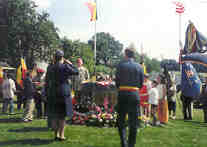 Eddie Peniche in the khaki trousers is second from the left.
Eddie Peniche in the khaki trousers is second from the left.
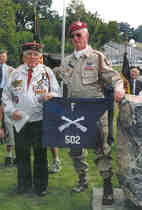 Ed Peniche and Ed Manley honor their fallen comrades from the 101st Airborne Division. They were both wounded at Longchamps on 3 January 1945.
Ed Peniche and Ed Manley honor their fallen comrades from the 101st Airborne Division. They were both wounded at Longchamps on 3 January 1945.
The headline from the newspaper L'Avenir read: "En l'honneur d'Eduardo Peniche, héros américain parmi tant d'autres." August 4, 1999. Also, the Saint Lamberth Church Bulletin in Longchamps, Belgium, announced "Inauguration et bénédiction de la stèle Peniche" on Sunday, July 25, 1999. "
"Parle, Seigneur, ton serviteur écoute." 1 Samuel 3, 10
Ed Peniche Updates
Edward Albert Peniche Day
November 9, 2002. Mayor Lee Brown, Houston, Texas, writes in his proclamation of 7 Nov. 2002, "On November 9, 2002, Edward Albert Peniche will be honored at a special veterans day commemoration. On this day, the City of Houston recognizes the significant and lasting contributions of this courageous veteran who served our country with honor."
Davalina, Fernando. "Peniche's War." Houston Chronicle Magazine.27 May 2001 8-12. Read this superbly written article about Eduardo Peniche, his love, his life, and his loss by University of Texas professor Fernando Davalina. Subscribers can access Houston Chronicle Archives at http://www.chron.com/
The Historian and the Veteran meet in New Orleans, LA

"Good job, Ed ..." said Stephen E. Ambrose as he signed two books for veteran Ed Peniche of the 101st Airborne Division. The two met in New Orleans, La.on June 5, 2000 in conjunction with the opening of the National D-Day Museum in that city. Professor Peniche served with the 101st Airborne from D-Day to VE-Day.
June, 2005
I recently heard from Ed - who is doing well and still making speeches about the importance of education to students and talking to groups around the world. Here is his most recent email, along with a couple of recent pictures:
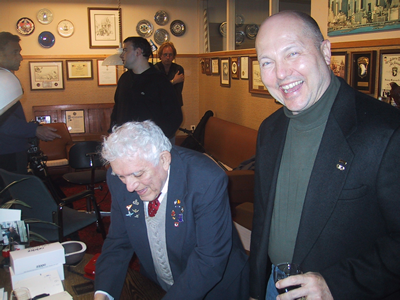 . . |
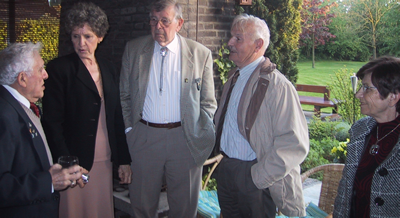 |
From: Ed Peniche [mailto:eap101st@sbcglobal.net]
Sent: Wednesday, June 01, 2005 2:38 PM
To: Whitley, Peggy
Subject: Fwd: E-mail met bijlage (attachment): IMG_0044.JPG
Hi, Peggy, thank you so much for your note and gracious comments. While President G. W. Bush was busy giving a speech in Holland, on Sunday, May 8th 2005, I was doing the same in Belgium, but my speech was at Longchamps before the Stele Peniche following the high mass service in the Parish church. Then, on May 9th, we went to Holland and here are some photos from the reception hosted by The Dutch Society of Friends of the Airborne. Peggy, my deep gratitude for your friendship and support is EVERLASTING! Kindest regards and best wishes,
Much affection, Ed and Deanie Peniche
NOTES FROM 2008
Ed came by my office recently just to say hello. He had come to the college to talk with students about the importance of education in all of our lives. He is just the same. Bursting with energy - and everyone gathered around to hear what he had been doing. The email following is shared by Cristy Coyne:
...This past semester, I was a volunteer tutor for the LIFT Program at St Thomas University, the Catholic University here in Houston. They want Dean and me as a team for the fall semester. LIFT = Literacy Initiative For Today is a program to teach ESL and acculturation to potential future U.S. citizens and green card immigrants = legal! This past semester, we had students from 15 countries. I am a Master Tutor; classes are on Saturdays: 9 a.m. to 4 p.m. In many ways, it is similar to what I did at Kingwood College from 1998 to 2002.
On May 6, I will give a lecture at a H.S. in Pasadena; on May 20, I will address the AARP of Houston; on June 6, I will address L'Aliance Francaise of Houston. In mid June I will lecture in Virginia. Staying busy is good for the soul and for the mind ...We enjoy it.
Speaking of TV, on April 29, the VA PR office has scheduled me for an interview here at home. They are preparing a documentary for national audience, in honor of Dr. Michael DeBackey 100 birthday in July. The award for my second Purple Heart Medal was held at the VA Medical Center here in Houston; it was a beautiful ceremony. Also my interview with GEARBOX Inc, (see on YouTube.com) of 2006, is being added to their impeding computer game: Hell's Highway to be released in the early fall. As you may recall, I am a veteran of that battle, of which the movie "A Bridge Too Far" was made.
Last, but not least, I was recently notified that the book RESPECT by Bob L, Vande Linde will be published in the fall; one entire chapter is the summary of my military service during WW II, long before I became a citizen of the USA, the greatest nation on earth!! I have also been interviewed for another book, GOD IN THE FOXHOLE. And I am merely 82; I still have long ways to go, and many things to do .... Warmest regards to you. See you!
Your friend and colleague, Ed Peniche
August 16, 2008, In Memory of Ed Peniche
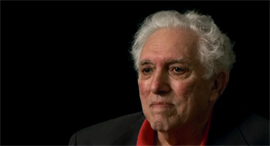 It is with great sadness that we report that our friend and colleague Ed Peniche has died at age 83. Ed's wife Dean wrote, "He died a very happy man - he had a magnificent last Sunday, but what day wasn't great for him. I've never known anyone so positive, upbeat, proud but also humble. " Those of us at Kingwood College will miss Ed's visits to the students to talk about his service to his country. He was a proud American. We will miss his visits to talk about the importance of education to our students. But most of all, we will miss his great love and friendship. He was as big as life itself. As Dean stated, "He was supposed to stay around 18 more years so that he'd hit 101 years and be able to go to the White House! But you know, Eduardo - he went along with God's timetable." We can't argue with that. Ed always knew when to do the right thing.
It is with great sadness that we report that our friend and colleague Ed Peniche has died at age 83. Ed's wife Dean wrote, "He died a very happy man - he had a magnificent last Sunday, but what day wasn't great for him. I've never known anyone so positive, upbeat, proud but also humble. " Those of us at Kingwood College will miss Ed's visits to the students to talk about his service to his country. He was a proud American. We will miss his visits to talk about the importance of education to our students. But most of all, we will miss his great love and friendship. He was as big as life itself. As Dean stated, "He was supposed to stay around 18 more years so that he'd hit 101 years and be able to go to the White House! But you know, Eduardo - he went along with God's timetable." We can't argue with that. Ed always knew when to do the right thing.
Write to Dean Peniche at deanpen1953@yahoo.com.
UPDATE: 2011 - I heard from Ed's wife, Dean, in the early spring. She tells me that she is still receiving email from people who knew Ed or have seen this website. Thank you for caring about a WWII soldier who loved his country - and spent his life sharing the importance of education with students. -pw 2011.
Page created '99 by Peggy Whitley. Links checked and updated, 6/2012 KV

